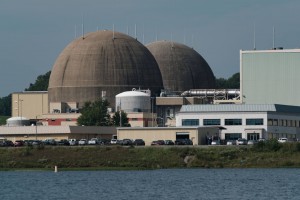From an Article by Sarah Vogelsong, Virginia Mercury, May 27, 2022
Dominion Energy’s two existing nuclear plants “may become more important to the transmission system” as Virginia and the utility move to decarbonize the power grid by midcentury, a hearing examiner with the Virginia State Corporation Commission says.
Under the 2020 Virginia Clean Economy Act, Dominion and Appalachian Power, the state’s two largest electric utilities, are required to close all Virginia power plants that rely on fossil fuels and source all their non-nuclear energy from renewables by 2045 and 2050, respectively.
The North Anna and Surry nuclear plants last year supplied just under 30 percent of the utility’s power, making nuclear the second-most used fuel source after natural gas for Dominion, the largest utility in the commonwealth.
“The value of the carbon-free generation that North Anna and Surry provide has been increased by the compliance obligations and potential costs associated with the VCEA,” wrote the examiner, Mathias Roussy, in a May 20 report.
If Dominion retires its nuclear units, the company will have to procure more renewable energy, either through building new generating facilities, contracting with third-party producers or purchasing renewable energy certificates.
“Without the nuclear units the system will rely more heavily on market purchases and sales for both reliability and to lower overall fuel costs,” wrote Glenn Kelly, Dominion’s director of integrated strategic planning, in testimony filed with the SCC earlier this year.
State Sen. Jennifer McClellan, D-Richmond, who was one of the patrons of the VCEA, told the Mercury Thursday that “the amount of nuclear we have right now is part of the puzzle to get us to clean energy,” although she said Virginia “shouldn’t need any new nuclear.”
Roussy’s report and Kelly’s testimony came as part of the State Corporation Commission’s review of whether Dominion should be allowed to recover costs associated with the relicensing of both North Anna and Surry.
North Anna, which is located in Louisa County, and Surry began operations in the 1970s under 40-year licenses from the federal Nuclear Regulatory Commission. Both later received a 20-year license extension, and since 2018, Dominion has been seeking second extensions for the facilities, which would bring their total operational lives to 80 years.
To date, the Nuclear Regulatory Commission has approved the Surry extension and is still reviewing the North Anna extension. In addition to the federal approvals, Dominion needs the State Corporation Commission’s approval to recoup costs related to relicensing the units and carrying out 33 capital projects to keep the plants running.
On May 20, Roussy recommended that the SCC sign off on an agreement struck this April between Dominion, commission staff and the Office of the Attorney General concluding that the extensions are “reasonably necessary and appropriate” and approving the utility’s recovery of $107 million in costs from customers starting Sept. 1.
“To the pillars of state electric regulation — primarily, cost and reliability, the VCEA effectively added another that is applicable to Dominion — decarbonization,” Roussy wrote. “All three pillars support continued operations at North Anna and Surry, although the capital upgrades for extended operations at North Anna are only needed if such operations are authorized by the” Nuclear Regulatory Commission.
Altogether, the relicensing and upgrades are expected to cost $3.9 billion. The April agreement states that the company will still need to petition the commission for recovery of costs incurred after 2024, noting that “the commission’s approval of cost recovery in this proceeding is not a ‘blank check’ for the duration of the program.”
In his report, Roussy emphasized that “most” of the costs associated with the life extensions “have not yet been incurred” and said that “ongoing regulatory oversight by the commission will be important” going forward. The commission will need to adopt Roussy’s recommendation in order for the approval to take effect.
#######+++++++#######+++++++########
See Also: What Happens to Nuclear Waste in the U.S.? Nuclear Energy Institute, 2019
“Right now, all of the nuclear waste that a power plant generates in its entire lifetime is stored on-site in dry casks. A permanent disposal site for used nuclear fuel has been planned for Yucca Mountain, Nevada, since 1987, but political issues keep it from becoming a reality.” [Geologic considerations regarding containment and leakage are also relevant, given the thousands of years this material will remain highly dangerous and toxic. The Nuclear Energy Institute is a nuclear industry trade organization, paid to provide favorable commentary. DGN]

